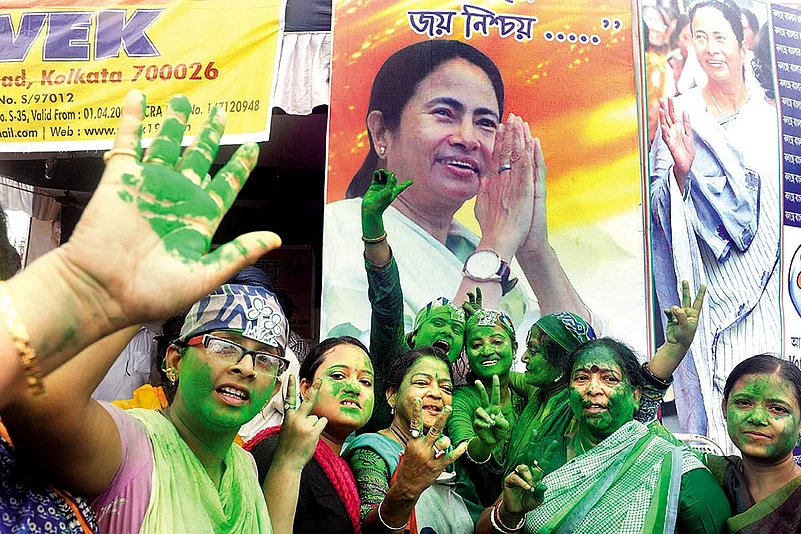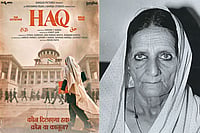What Worked For Didi
- Voters do not mind dealing with a one-woman party with hardly any internal debate
- Bengal’s GDP growth rate, marginally higher under Mamata than under the Left, bucked national decceleration
- The Sarada scam and the Narada sting thrown at Mamata through the media rebounded on opposition
- Big industry avoided West Bengal but giving away bicycles and cheap rice worked in cultivating a vote-bank of the underclass
- Memories of Left misrule still fresh in voters’ minds after five years for alliance with Congress to bear impact
- Rough elements of the ‘syndicate’ may be out on the streets, but Left ‘goondaism’ cannot be wished away either
***
What Worked For Amma
- Insinuations on her health, accessibility, sycophancy found little favour
- GDP growth rate slowed in last five years, but Tamil Nadu is too important to slip
- Welfare schemes all through her term spawned a steady, grateful electorate
- Poll-eve freebies like 50% subsidy on mopeds, 8 gm gold for new brides worked
- DMK made big strides from its 2011 tally, but alliance with Congress weighed it down
- Handling of Chennai floods didn’t have any impact across the state
***
At a street-corner meeting in Behala Chaurasta in downtown Calcutta, under an under-construction flyover, a TV crew from Delhi is on the stage with Mamata Banerjee, negotiating for an interview slot. The enthusiastic crowd of 2,000 is getting restive. Suddenly, Mamata dashes to the lectern, clutching her sari, and scolds the gathering: “Can’t you see I am talking to the media from Delhi? Can’t you wait quietly for a few minutes?” A wave of laughter ripples through the quietening crowd. Mamata has this easy, warm connect with people—not the leader and the led, but as one of them, their diminutive Didi, who both listens to and scowls at them.
An enormous Jayalalitha rally in Villupuram, off Chennai, presents a different scene. A dozen gigantic cutouts of Amma keep stern watch over two lakh people; rousing music rises on a crescendo; crystal-clear LED screens dot the large arena. Amma is a distant figure, yet when she starts speaking, the crowd swoons, women wipe off tears of elation, men pump their hands and bow, as if to a deity come alive.
Didi and Amma, sister and mother, as different as machher jhol is to masala dosa, and yet both trend-beaters and consummate leaders of masses. It is the only time a party has held on to power in Tamil Nadu since MGR did in 1984. And if the TMC defeated the Left in West Bengal in 2011 after 34 years, it has annihilated it this time. Why do people buy their promises, and how much stronger will they get?
There is a waiting game in Tamil Nadu before the elections as to who, among the DMK and the AIADMK, comes out with the manifesto first. One wants to check out the freebies the other announces, and better it. There was much applause by mediapersons and industrialists when the DMK’s manifesto, published about a month before polling day, had no freebies. Finally, sense has prevailed over Tamil politics and reformist ideas have come in, they said. “In these elections, we are moving away from freebies as both parties know the drain they put on the exchequer, now that the state economy is sagging,” a top industrialist in Chennai had said a few weeks back.
But voters were already speculating whether Amma will give away refrigerators or motorcycles this time. She didn’t disappoint much. Days before D-Day came the AIADMK’s bountiful manifesto, offering free mobile phones for ration card-holders, laptops with internet for students, maternity assistance of Rs 18,000, waiver of all farm loans, 50 per cent subsidy to buy scooters, an eight-gram gold coin for marrying women. And with it, came magic at the hustings. “I think the elite always pooh-poohs freebies and dismisses them as bribes,” says columnist Sushila Ravindranath. “But to people it is meant for they are very important. A new TV, or even a mixie-grinder-cooker is a prized possession in a city slum or for the village poor. If a government promises them and, crucially, is able to deliver them, it’s commendable.”
In West Bengal, the freebies are not as tantalising—rice at Rs 2 for BPL families, schemes like Kanyashree, where girl students are given cycles and bangles, and keeping neighbourhood clubs happy with donations of a few lakhs. Like Jayalalitha, Mamata has figured that they work. Proving Sushila’s point, a woman from Paschim Medinipur, in the erstwhile MaoIST stronghold in Jangalmahal, says: “I get rice at Rs 2 a kilo, so I will vote Didi for it.” This perhaps works even better than ‘big development’. Mamata still hasn’t shed her ‘anti-industry’ image from when she stormed to power on the back of the Singur and Nandigram land struggles, and when one of her first moves was to introduce a land policy preventing takeovers from industrialists. This perception of being pro-farmer still gets her votes. Trinamool’s Shuvendu Adhikari has won from Nandigram with a margin of 81,231 votes.

Jayalalitha with grateful partymen
‘Soot-boot ki sarkar’ Mamata is not; what’s more, she uses her ‘anti-industry’ image to her advantage. In her rallies, Mamata always took the charges of corruption against her government—the many-tentacled Sarada chitfund scandal and the Narada sting where some TMC ministers were seen allegedly taking bribes—head on. She would wave her finger and scream: “They call me chor (thief)? I don’t take a single paisa from government, I pay for my own tea. My only earning is my royalty from the 65 books I have written.” How can an unmarried lady who roams around in a plain sari and rubber chappals be corrupt, many in the crowd would murmur. The day-to-day vitriolic attack on her and her party by Bengal’s most powerful news organisation, media baron Aveek Sarkar’s ABP Group, too seems to have just ricocheted off her. (In her victory speech, she sarcastically asked an ABP reporter if he had the permission to congratulate her.)
Driven by a Election Commission sworn to root out political violence, the police (many senior officers ‘close’ to the regime had been transferred out before polling days) and CRPF had acted as iron-fisted vigilantes during voting, eliciting Mamata’s ire and veiled threats of revenge. Will she be vindictive now? When she took over as CM, her temperament was a talking point. In her first year, author Mahasweta Devi, a supporter till then, called her a ‘fascist’. She summarily removed honest police officers and harassed dissenters like Ambikesh Mahapatra of Jadvapur University, who shared a cartoon of hers on social media. So how come Calcuttans have voted her back 11-0 in the city? “This image of Didi is all wrong. People who really know her will never believe these things,” says film-maker and actor Arindam Sil, a former Left supporter. “Yes, she is fiery, she is unpredictable, but she is never vindictive or vicious. Her anger lasts just for a minute....,” he says.
Jayalalitha too has unique personality traits. Some observers say she has become more aloof after she came back from her stint in jail last year. Some industrialists in Chennai and Coimbatore feel she trusts her ministers and officers even less now. There has been a lot of speculation about her ill-health and political future too. But to voters, her 20-minute campaign rallies that came once every two days, where she quickly took her seat and delivered her speech, was enough communication. “They believe that a true leader should not be easily accessible, that they should have a kind of mystique, an aura around them,” says political commentator Gnani Sankaran.
This may not be true in Bengal, where Didi gets thoroughly mobbed every time she steps out of her security cordon and reaches out. Everyone, young and old, men and women, wants to touch her hands, touch her feet, to seek or bestow blessings. It’s her enduring charisma that the opposition—the hurriedly put together Left-Congress ‘jot’—just couldn’t fathom. A graffiti in Calcutta, pointing to the bloody legacy of the arch-rivals who had joined hands says: “Rokter shathey mishey gechey kobji kata haath” (blood cakes a hand severed at the wrist). It refers to the brutal murder in the ’70s of two sons of a Congress politician before their mother by Communists. The Left stands annihilated in Bengal today.
Jayalalitha certainly faced stiffer opposition. DMK supremo Karunanidhi’s son M.K. Stalin did have enough ambition. His namakku naame people-to-people contact programme last year, untiring pre-poll rallies and endless meetings with party cadre did point towards a changed man. His party stands almost equal to the AIADMK on voteshare. But they were not prepared for the final Amma juggernaut that humbled them. She and Mamata Banerjee would be looking to render the opposition even more sterile in the coming days. People in both their states have entrusted them with enormous responsibility to redeem their pledges of plenty. It is up to Amma and Didi to honour that trust.
By Satish Padmanabhan, with Dola Mitra in Calcutta and Ajay Sukumaran in Chennai



























